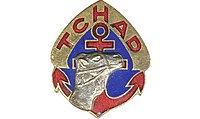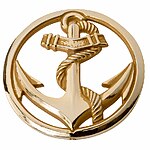Régiment de Marche du Tchad
| Régiment de marche du Tchad | |
|---|---|

Regimental insigne
|
|
| Active | 1943 - Present |
| Country | France |
| Branch | French Army, ex-Free French |
| Type | Troupes de Marine |
| Role | Mechanised Infantry |
| Size | 1200 |
| Part of | 2nd Armoured Brigade. |
| Garrison/HQ | Quartier Colonel Dio, Meyerheim |
| Colors | Red and blue |
| Anniversaries | 1 September (Battle of Bazeilles) |
| Engagements | Koufra (1941), Fezzan (1942), Sud-Tunisien (1943), Alençon (1944), Paris (1944), Strasbourg (1944). |
| Commanders | |
| Current commander |
Colonel de Cevins |
| Insignia | |
| Beret badge of the Troupes de Marine |  |
| Abbreviation | RMT |
The Régiment de marche du Tchad (RMT, "Ad hoc Regiment of Chad") is a mechanised unit of the French Army, belonging to the Troupes de Marine. It is part of the 2nd Armoured Brigade. Formerly garrisoned north of Noyon it was moved in July 2010 to Quartier Colonel Dio, Meyenheim, Alsace.
The Régiment de marche du Tchad was formed in July 1943. It became the infantry regiment of the 2nd Armoured Division.
The RMT was formed grouping personnel from mainland France belonging to the Régiment de Tirailleurs Sénégalais du Tchad, as well as other elements from mainland France or from Europe who had joined the Allies in North Africa. For instance, its 9th company, commanded by Captain Raymond Dronne, was nicknamed La Nueve because it was mainly formed with veterans from the Republican side of the Spanish Civil War. The 9th Company was actually formed in Chad (1941), before the regiment as a whole.
On August 20, 1944 Charles De Gaulle received information that a great civilian revolt against the Germans had broken out in Paris. He requested the Allied Supreme Command to send French troops to liberate the capital. Upon receiving instruction to advance on Paris with the 2nd Division, Leclerc ordered the 9th Armoured Company to march onto Paris as an advance party.
At 21:22 hours the night of August 24, 1944, La Nueve burst into the centre of Paris via the Porte d'Italie. On entering the Town Hall Square, a 9th Company tank, "Ebro", fired the first shots against a large group of German artillery and machine guns. Civilians took to the streets singing La Marseillaise, and were surprised when they discovered that the soldiers that had turned the course of the battle of Paris were of Spanish origin. Later, the commander of the 9th Company, Raymond Dronne, demanded unconditional surrender from the German commander, Dietrich von Choltitz.
...
Wikipedia
